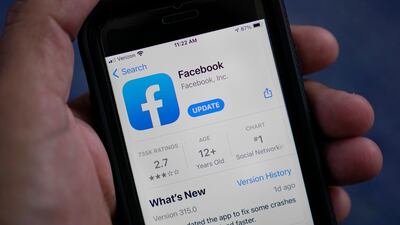Facebook is planning to end a policy that exempts politicians from following the platform's rules and guidelines.
The policy stipulates that as a result of the newsworthiness of politicians and their content, posts that breach community standards are allowed to remain online.
The newsworthiness policy was championed by Facebook chief executive Mark Zuckeberg.
In practice, the policy means that posts from politicians that spread false information, incite violence or are otherwise offensive are permitted to remain on the platform because of Facebook's belief that the posts serve the public interest.
Several news outlets reported that Facebook is ready to announce the policy reversal as early as Friday.
The change in policy was first reported on Thursday by the tech site The Verge and later confirmed by The New York Times and The Washington Post.
Facebook repeatedly came under fire for this policy during the presidency of Donald Trump, when posts from the former president that spread misinformation were exempt from removal.
But the company says it had never applied the newsworthiness exemption to any of Mr Trump’s posts.
Facebook is debating whether to allow the former president back on the platform. He was suspended from Facebook indefinitely after the deadly insurrection at the US Capitol on January 6.
Facebook cited “the risk of further incitement of violence” as justification for Mr Trump's removal.
Last month, the company's oversight board, responsible for reviewing Facebook's most controversial content decisions, said Facebook was justified in suspending the former president's account.
But the Facebook-funded board demanded that the company address the indefinite nature of the ban, by either permanently removing Mr Trump, suspending him for a specific period of time, or reinstating him.
The board said that "the same rules should apply to all users", as it called for Facebook to "address widespread confusion about how decisions relating to influential users are made".
Facebook's newsworthiness exemption was first introduced in 2016, but it drew attention in 2019 when Nick Clegg, the company's vice president of global affairs and communications, announced that speeches from politicians would be treated as "newsworthy content that should, as a general rule, be seen and heard".
The newsworthiness exemption, he explained in a blog post at the time, meant that if “someone makes a statement or shares a post which breaks our community standards we will still allow it on our platform if we believe the public interest in seeing it outweighs the risk of harm”.
The policy reversal could affect politicians in the Middle East, where digital rights activists have long accused Facebook of uneven enforcement of its rules.
Iran's Ayatollah Ali Khamenei frequently uses his accounts to share false or incendiary information. He has previously made posts denying the Holocaust, denouncing Covid-19 vaccines and inciting violence against the writer Salman Rushdie. While Twitter took action against Mr Khamenei's posts and even suspended his account, Facebook has been more lenient with the Iranian leader.
Digital rights activists also cite Syria's Bashar Al Assad and Israel's Benjamin Netanyahu as leaders who flout platform rules in spreading incitement to violence.


